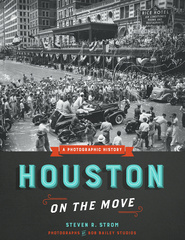
Texans love the idea of wide-open spaces and, before World War II, the majority of the state’s people did live and work on the land. Between 1940 and 1950, however, the balance shifted from rural to urban, and today 88 percent of Texans live in cities and embrace the amenities of urban culture. The rise of Texas cities is a fascinating story that has not been previously told. Yet it is essential for understanding both the state’s history and its contemporary character.
In The City in Texas, acclaimed historian David G. McComb chronicles the evolution of urban Texas from the Spanish Conquest to the present. Writing in lively, sometimes humorous and provocative prose, he describes how commerce and politics were the early engines of city growth, followed by post–Civil War cattle shipping, oil discovery, lumbering, and military needs. McComb emphasizes that the most transformative agent in city development was the railroad. This technology—accompanied by telegraphs that accelerated the spread of information and mechanical clocks that altered concepts of time—revolutionized transportation, enforced corporate organization, dictated town location, organized space and architecture, and influenced thought. McComb also thoroughly explores the post–World War II growth of San Antonio, Dallas, Fort Worth, Austin, and Houston as incubators for businesses, educational and cultural institutions, and health care centers.
Individuals interested in knowing more about the various pathways to modern Texas cities will find much worthy of exploration in McComb’s new book.
After finishing the book the reader will no longer be able to ignore the many contributions that the cities of Texas have made to the state...a valuable addition to the scholarship of the urban Southwest and should be read by those interested in Texas and its transformation from a rural to an urban state.
[An] intriguing synthesis.
The broad, efficient sweep of McComb's writing style is remarkable...The book represents a major accomplishment in Texas historiography and is highly readable. If you read one work in 2017 that examines the entire state, McComb's study would make a fine choice.
Military towns, railroad outposts, lumbering centers, river communities, and port cities all get coverage in The City in Texas . . . [A] solid introduction to Texas urban history.
This book is a treasure trove of information, representing a lifetime of research, and it will be indispensable . . . for years to come.
This is the only comprehensive synthesis of the urban history of Texas that I'm aware of. Commanding the deep experiences of a lifetime of study of Texas and its cities, McComb combines an interesting narrative with a compelling analysis of the Lone Star State’s urban places. His book will help a broad array of readers to understand that urban history, often dealt with as an afterthought when it comes to Texas, is fundamental to an understanding of the state’s development.
Introduction: Theories, Definitions, Historians
Part One: First Things
1. The Lay of the Land
2. The Influence of the Native Americans
3. The Towns of the Spanish Empire in Texas
4. The Coming of the Americans
5. The Towns of the Texas Revolution
Part Two: The Dirt Road Frontier, 1836–1900
6. Major Events
7. The Dirt Road
8. Migration: Gone to Texas
9. The Evolution of San Antonio
10. The German Towns of Texas
11. The Coastal Ports
12. The River Ports
13. The Political Towns
14. The Military Towns
15. The Railroad Towns
16. The Lumber Towns
17. The End of the Dirt Road Frontier
Part Three: The Amenities of City Life, 1900–1950
18. The Rural to Urban Shift
19. The Great Galveston Storm
20. Spindletop and Beaumont
21. The Oil Towns
22. The Elite Rule of the Cities
23. The World War I Era
24. The Entrancement of the City
25. The Great Depression
26. World War II
27. The Immediate Postwar Years
Part Four: Great Texas Cities, 1950–2012
28. Population and Urban Expansion
29. Suburbs and Subdivisions
30. Segregation and Integration
31. The Hispanic Identity
32. John F. Kennedy and Dallas
33. The Voting Rights Act and the Cities
34. Land Transportation
35. Airlines and Airports
36. Urban Excellence in Texas
37. Houston, a Renaissance City
38. The Infrastructure for Excellence
39. The City and the State: A Conundrum
Notes
Suggestions for Further Reading
Index











